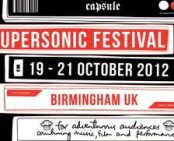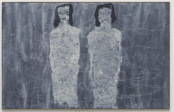Eleven albums into a music career which can lay a fair claim to the title 'cult band', Piano Magic resist categorisation by virtue of developing and altering their musical style with each release. There are consistent elements to the band's sound, but more thematic than sonic. An occasional overindulgence in darker/more tortured-than-thou accenting is one. Not bleak exactly, but verging on a morbid, narcissistic obsession with the negative psychological tendencies in the human condition. Melancholy, depression, nihilism – that kind of thing.
Still, for those listeners who don't react to paranoid android navelgazing with the urge to deliver a solid kick to the arse, the release of a Piano Magic album is an anticipated event. Electronica techniques and approaches underpin Life Has Not Finished With Me Yet, more in the role of atmospheric backdrop and drama-accentuating beats than the depressed-Hot Chip overlays of 2005's poppier Disaffected.
Any comparison to Disaffected should stop there though. Whilst the new album has electronica aspects, it has more in common with Piano Magic's earlier work. The sound is analogue, organic, vocal. More Dead Can Dance than Depeche Mode, in terms of a synth/sequencers approach to ponderous songsmithing (fans will point out that Piano Magic and Dead Can Dance have indeed collaborated in the past).
But Depeche Mode are mentioned with reason, there is a distinct whiff of them in 'Judas', both in the low-end synth build, and in the lyrical imagery of corruption, crowns of thorns, Judas: 'as they're wiping your kiss from their lips/ They're secretly cursing your name'.
the self-conscious tortured swagger of Glen Johnson's lead vocal
Some of the lurid theatrics of 'The Slightest of Threads' push the ability to keep a stright face. As with any cult band/TV series/subculture, fans will defend the idiosyncracies of their chosen devotion object with the cry that detractors 'just don't get it', but the self-conscious tortured swagger of Glen Johnson's lead vocal is far too reminiscent of the similarly opinion-splitting theatrics of Nick Cave to be anything other than irritating. Rhyming 'temperature drops' with 'cry of a fox' also stretches the plausibility of the song, which if it weren't laid on so thickly, has the scene-building aplomb of a young Matt Johnson, 'Venus in Furs' guitar clashes and a bold, slow tempo.
Angele-David-Guillou's vocals on 'Sing Something', and 'A Secret Never Told' are a healthy distraction from Alba's portentious tones, although the theremin and dulcimer (and perhaps cymbalan?) details on both tracks do verge into Portishead/John Barry territory on occasion.
Title track, 'Life Hasn't Finished With Me Yet', recounting (with an undertone of humour, it must be admitted) the failed suicide attempts of its protagonist, is the dividing line between those who will listen to this album in hushed awe, and those who will burst out laughing at the Buffy/Twilight/Poe pastiche. The macabre humour set against a Balkan-folk approach to melody accents what is essentially a funereal keening of self-indulgent woe, but Johnson uses his most overbearing Nick Cave/Tom Waits/Leonard Cohen vocal stylings on this track, and you either lap that up or snigger.
a funereal keening of self-indulgent woe
More interesting is '(The Way We Treat) The Animals', using a relaxed, unhurried bassline and drum pattern to create a quintissential darkwave track. The skill is in holding the listener's interest with well-timed elements of punctuation (keyboard chords, a violin figure, a strummed acoustic guitar), none of which interrupt the contemplative vibe of the song. Never as simple as it sounds. The vocal is clear, unaccented and honest on the track, dropping the pretense that sometimes taints his vocals elsewhere on the album, and the gradual build in elements and complexity as the track develops is very deft.
That slow build, and layering on of sonic elements is a recurrent theme in the album, along with the calm recounting of obsessive love/loss lyrics and anguished female backing vocals. Its scope and subject matter is refreshingly ambitious (if not always free of artistic clunkiness) and the atmospherics of industrial and minimal techno that run along the length of the album bring a solidity to the sound which would be sorely missed in an analogue-only effort at the same songs.
Indulgent, but rewarding.
Out on Second Language Music, June 11th.
www.piano-magic.co.uk
Sean Keenan used to write. Now he edits, and gets very annoyed about the word ‘ethereal’. Likely to bite anyone using the form ‘I’m loving….’. Don’t start him on the misuse of three-dot ellipses.
Divides his time between mid-Spain and South-West France, like one of those bucktoothed, fur-clad minor-aristocracy ogresses you see in Hello magazine, only without the naff chandeliers.
Twitter: @seaninspain















